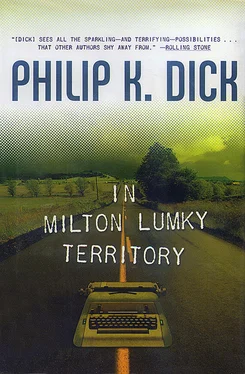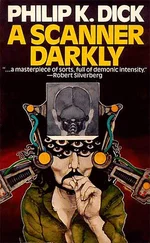Philip Dick - In Milton Lumky Territory
Здесь есть возможность читать онлайн «Philip Dick - In Milton Lumky Territory» весь текст электронной книги совершенно бесплатно (целиком полную версию без сокращений). В некоторых случаях можно слушать аудио, скачать через торрент в формате fb2 и присутствует краткое содержание. Город: New York, ISBN: , Издательство: Tom Doherty Associates, LLC, Жанр: roman, на английском языке. Описание произведения, (предисловие) а так же отзывы посетителей доступны на портале библиотеки ЛибКат.
- Название:In Milton Lumky Territory
- Автор:
- Издательство:Tom Doherty Associates, LLC
- Жанр:
- Год:неизвестен
- Город:New York
- ISBN:978-0-7653-1695-0
- Рейтинг книги:4 / 5. Голосов: 1
-
Избранное:Добавить в избранное
- Отзывы:
-
Ваша оценка:
- 80
- 1
- 2
- 3
- 4
- 5
In Milton Lumky Territory: краткое содержание, описание и аннотация
Предлагаем к чтению аннотацию, описание, краткое содержание или предисловие (зависит от того, что написал сам автор книги «In Milton Lumky Territory»). Если вы не нашли необходимую информацию о книге — напишите в комментариях, мы постараемся отыскать её.
In Milton Lumky Territory — читать онлайн бесплатно полную книгу (весь текст) целиком
Ниже представлен текст книги, разбитый по страницам. Система сохранения места последней прочитанной страницы, позволяет с удобством читать онлайн бесплатно книгу «In Milton Lumky Territory», без необходимости каждый раз заново искать на чём Вы остановились. Поставьте закладку, и сможете в любой момент перейти на страницу, на которой закончили чтение.
Интервал:
Закладка:
It makes a difference, he said to himself, surveying what he had accomplished.
The next morning he drove down early and began on the display. By nine o’clock, when Susan appeared, he had finished it.
“How does it look?” he said.
“Just wonderful,” she said, standing in her coat and gazing around the place, entranced and wide-eyed.
Having finished the window display he set off in the Merc to shop for the counter material. He picked up a synthetic knotty pine; the material came in rolls, like veneer, to be glued on. Then he took a long look at cash registers. Too expensive. But he compromised on a receipt-writer that made three copies. Money would have to continue to be kept in their change-drawer.
All afternoon he glued and tacked away at the counters. When he finished, they had before them a new counter.
“I can’t believe it,” Susan said.
“These new plastic synthetic wood veneers are great stuff,” he said. He then figured out how much it would cost to glue the veneer to the entire interior walls. Too expensive. So he got out his paint brushes and resumed the painting of the walls.
The last item that day consisted of buying and setting up an all-night spotlight for the window. It lit up one gold-colored portable. That, and the whirling platform, remained on all night.
“Costs money to keep it on,” he admitted to Susan, “but it acts as a night light. It casts a glow into the store, so if anybody’s inside robbing us, the police can see him.”
The new colors that he had painted the walls and ceiling made the store much lighter. And they gave the illusion of greater size. The walls and ceiling appeared to recede.
“We just got ourselves some free space,” he told Susan.
As they walked out to the car he told her that tomorrow he wanted to lay nylon tile on the floor. He knew where he could pick it up wholesale.
“Isn’t that—and all this other—going to set us back a lot?” Susan asked.
“No,” he said.
“What else do you intend to do?”
“I want to make changes in the front,” he said. “But that’ll take professional carpenters. I’ll let that go until we’re wealthy. Maybe later on this year. And I’m going to dump all the junky old dogs. The used machines. Those damn old Underwood 5 models that you’re trying to sell for fifteen dollars. They’re not worth the space they occupy. You have to figure the value of me space. In a store this small, space is worth quite a bit. You can plaster and paint and buy new fixtures, but you can’t create space.” That reminded him that he wanted to see about new overhead lights, the soft fluorescent kind.
“I hope we don’t go bankrupt,” she said. “Just buying paint.”
“We’ll go bankrupt buying things to sell,” he told her. That was the big thing. Something to sell.
God damn it, he thought, I’ve got to get something I can sell !
Armed with the store’s books—he affirmed it to be a store, now, and not an office—he showed up at the Idaho Central Bank, Boise Branch, and opened discussions about a loan.
After several hours of discussion the bank informed him that all things considered, they possibly could advance the store a long-term loan of two thousand dollars. It would take at least a week to approve it. But very possibly it would eventually go through.
He left the bank in a happy frame of mind.
That evening he arranged for a babysitter to take care of Taffy. He drove Susan out along the county road that brought them eventually to the farmhouse in which his parents lived. The bumpy drive made Susan a little carsick. When at last they parked, she said, “Could we sit for a while? Before we go in?”
He said, “I want to go in first anyhow.” He had not told his parents about his marriage.
“That’s fine with me,” she said. She had put on white gloves and a hat; very dressed-up, with much lipstick, she had the same dramatic aura that he had been so taken with, that first night. But her cheeks had a hollowness, and lines had formed under her eyes. Beyond any doubt she did need a rest.
“There’re a few things I want to discuss with them first,” he said. He kissed her, got out of the car, and walked up the gravel and dirt shoulder to the gate.
Here it was again, the tall gray ancient farmhouse, with dry soil around it, the weeds and geraniums growing out of the bare brown earth. No lawn. No green to speak of, except the ivy growing over me fence and around the gate. On the front porch a row of flower pots had in them indistinct clumps of growth. And he saw a wicker chair, and a plantstand on which lay a stack of Reader’s Digests .
Imagine having been born in a run-down building like this, he said to himself, as he opened the gate.
Off in the back a dog whooped noisily. He saw yellow light behind the window shades of the front room. And he could hear the boom of a TV set. Parked near me tumble-down garage was the same rusting, useless carcass of a 1930 Dodge; he had fooled around in it as a child.
I lived here while I attended Garret A. Hobart Grammar School.
The basement windows had cobwebs behind then; one showed a crack, which had been stuffed with a rag. So his father did not sleep down there any longer, now that both he and Frank had left. No doubt his father slept upstairs in one of their rooms.
His father had slept during the day, arising at ten o’clock at night, pushing up the trap door and appearing so that he could shave and eat and set off for his job. During the day he slept under their feet, beneath the floorboards. With the quart jars of apricots and the lumber and wiring.
In the morning, home from work, his father smacked off me white dust covering him; his job at the Snow White Bakery kept him buried elbow-deep in flour. Then, in the basement, he involved himself in another white dust: plaster dust, from his eternal puttering about with new partitions. He intended to make the basement into several rooms, to create a separate apartment with bath and bowl which he would rent out. The war had stopped his supply of materials. Outside the house, along the driveway, rolls of wire and heaps of beaverboard gathered bird excretion, rust, and rot. Sacks of cement became wet and sank into corruption that allowed tiny weeds to sprout within them. In the basement, before he retired at two in me afternoon, his father sawed away, filling his lungs with sawdust. He patiently breathed in wood dust, flour, plaster dust, and, in the summer, dust and weed-pollen from the fields.
Bruce, standing on the path, saw in the evening darkness that the apricot trees by the back door had died. Thank God, he thought. Nobody had ever used the apricots; the thousands of jars of them down in the basement would never be opened. As a kid he had lugged jars outdoors and hurled rocks at them, bursting them in showers of sticky juice and glass. That had brought the hornets. In summer, the pools of apricot juice had become a buzzing swamp, wriggling with the yellow backs of the hornets. Nobody had dared go within yards of them.
Up the steps, now, to rap on the front door. Under his feet the boards of the porch sagged; the entire porch leaned. At one time, years ago, the house and porch had been painted a battleship gray. Now the house had chipped and peeled until the boards themselves showed through, strips of yellowish brown beneath the gray.
He lifted back the metal knocker and let it bang.
The door opened and there stood Noel Stevens, his face smeared with day-old beard, in his suspenders, his shirtsleeves rolled up. He admitted Bruce without comment. His father, heavy and inert, lifted his hand and silently beckoned to Brace’s mother, who was in the kitchen. To Bruce, his father had always looked like a workman from the turn of the century, the massive honest not-too-bright Swedish hodcarrier or plumber who had arrived and gone directly to Minnesota and had never learned the language or visited any of the cities. The man’s face was wide, shiny except for the cheeks and chin, with a long nose bent or broken in the center, and fleshy. The skin, below his eyes, showed many craters that were faintly brown, almost like liver spots.
Читать дальшеИнтервал:
Закладка:
Похожие книги на «In Milton Lumky Territory»
Представляем Вашему вниманию похожие книги на «In Milton Lumky Territory» списком для выбора. Мы отобрали схожую по названию и смыслу литературу в надежде предоставить читателям больше вариантов отыскать новые, интересные, ещё непрочитанные произведения.
Обсуждение, отзывы о книге «In Milton Lumky Territory» и просто собственные мнения читателей. Оставьте ваши комментарии, напишите, что Вы думаете о произведении, его смысле или главных героях. Укажите что конкретно понравилось, а что нет, и почему Вы так считаете.










